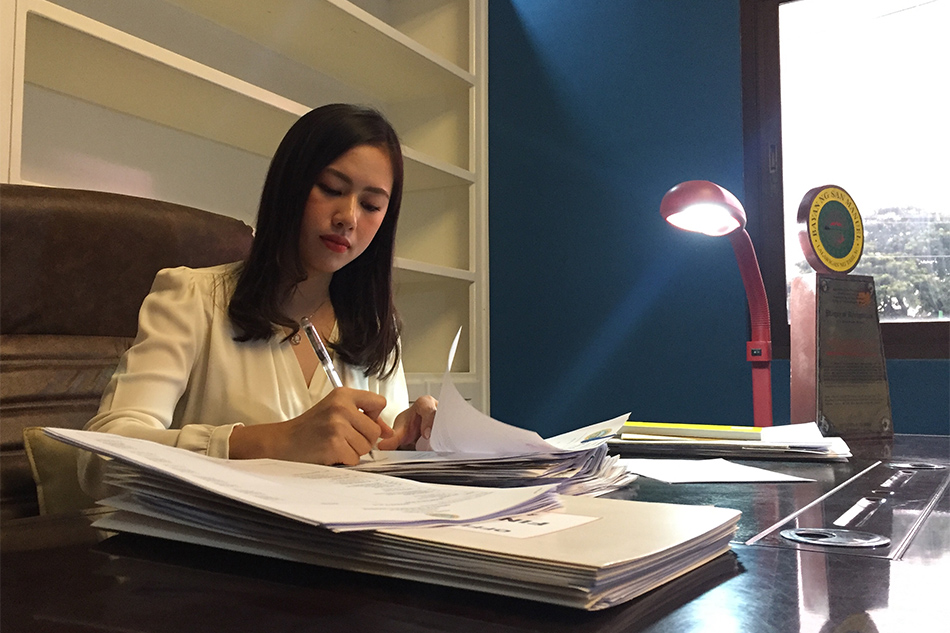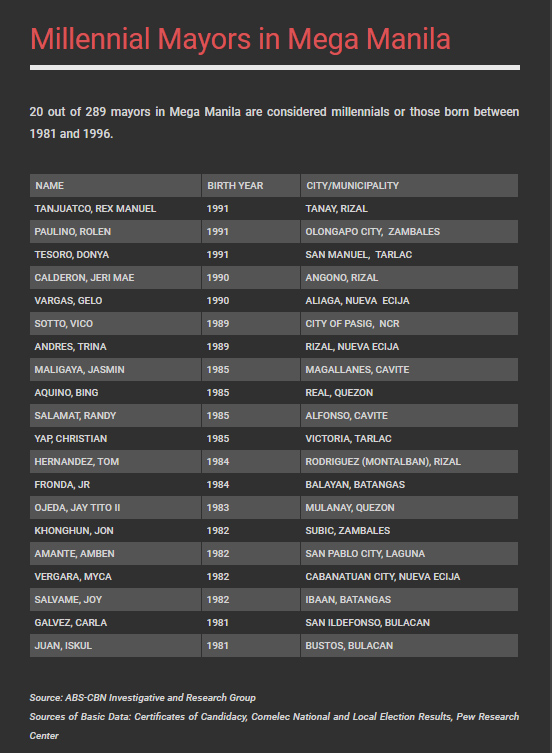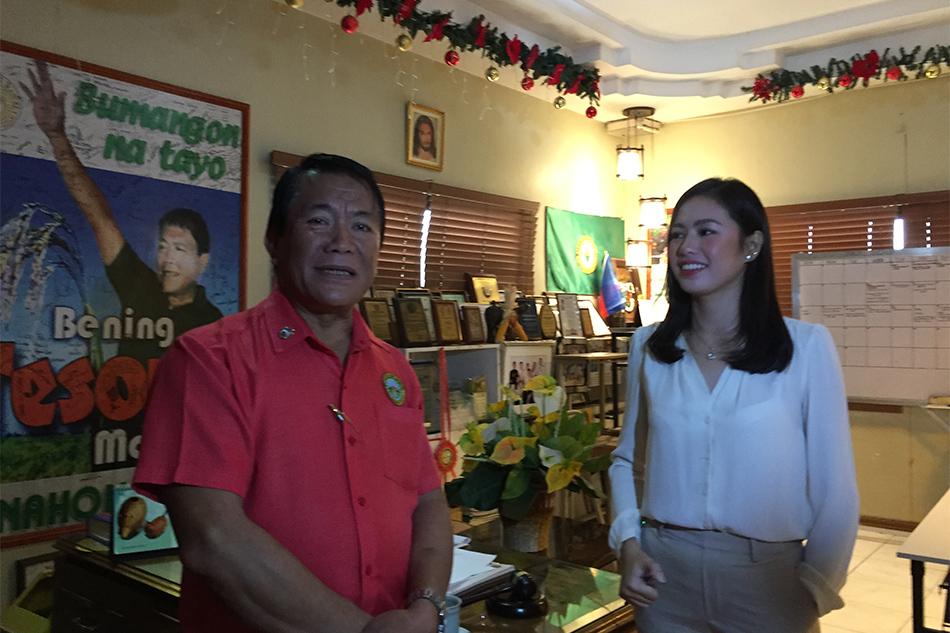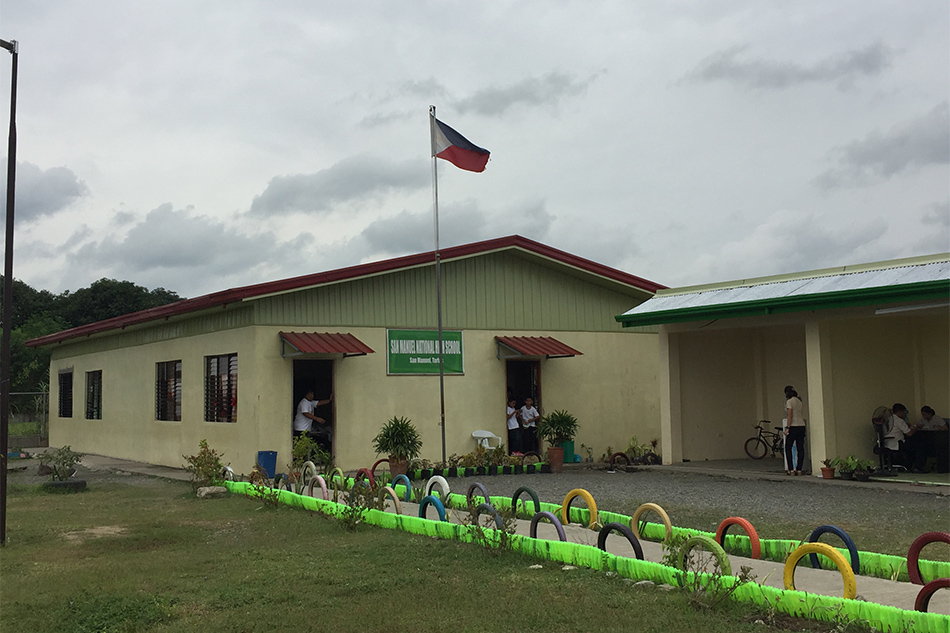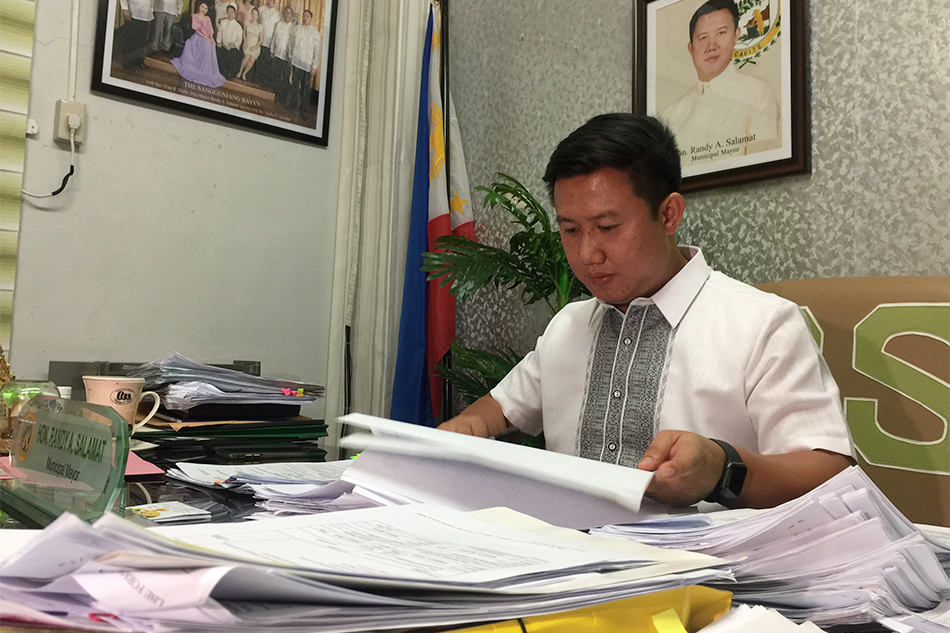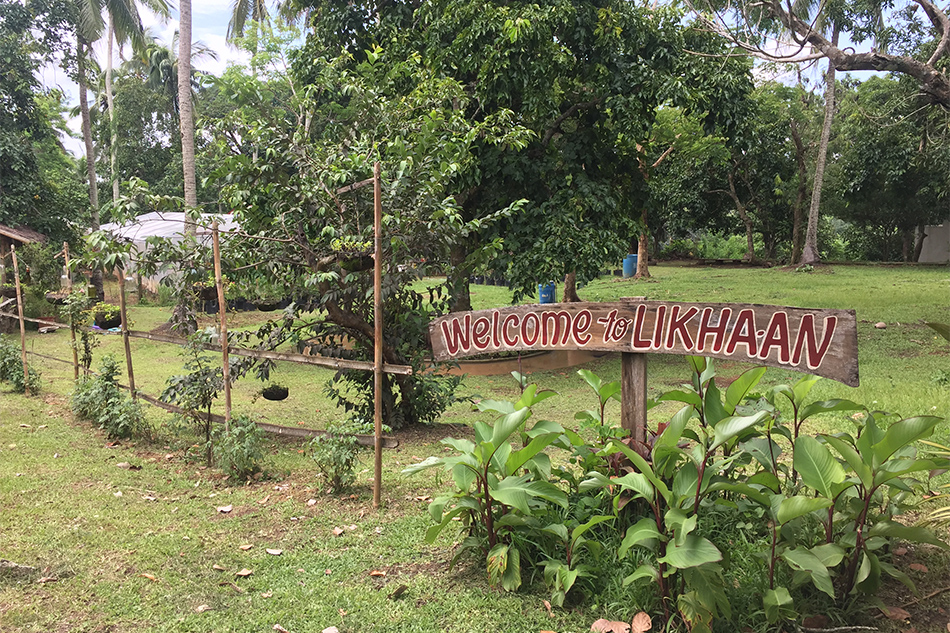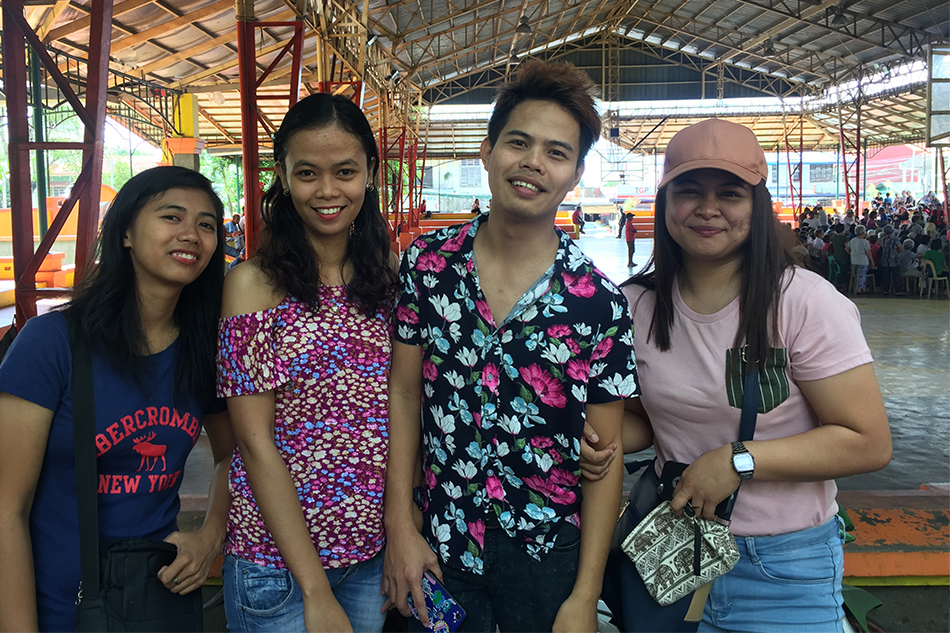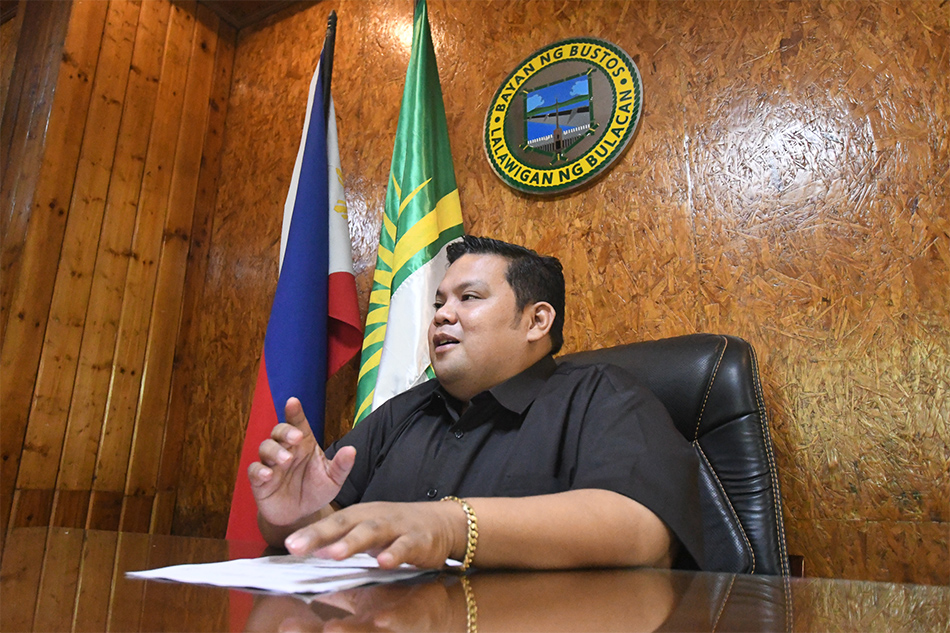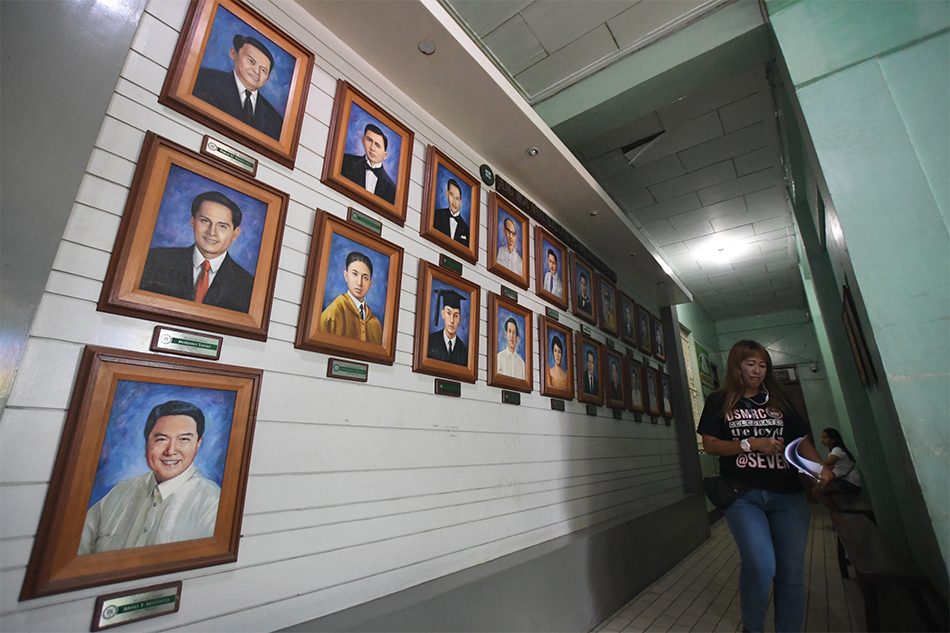Millennial mayors: Meet Donya, Randy, and Iskul | ABS-CBN

Welcome, Kapamilya! We use cookies to improve your browsing experience. Continuing to use this site means you agree to our use of cookies. Tell me more!
Millennial mayors: Meet Donya, Randy, and Iskul
Millennial mayors: Meet Donya, Randy, and Iskul
Kristine Sabillo,
ABS-CBN News
Published Jul 30, 2019 04:40 PM PHT
Donya Tesoro’s Instagram feed is perfectly curated.
Donya Tesoro’s Instagram feed is perfectly curated.
In one photo, she is sitting on a wooden dock, looking up at the sky, with the sea and an island as backdrop. Another snapshot shows her staring straight at you, her hair tousled and lips slightly parted. Interspersed with these are photos of her being hugged by old women or posing with children in the middle of a crowd.
In one photo, she is sitting on a wooden dock, looking up at the sky, with the sea and an island as backdrop. Another snapshot shows her staring straight at you, her hair tousled and lips slightly parted. Interspersed with these are photos of her being hugged by old women or posing with children in the middle of a crowd.
If you are not familiar with the 28-year-old’s pretty face, you would think that she is a model, a celebrity or a social media influencer.
If you are not familiar with the 28-year-old’s pretty face, you would think that she is a model, a celebrity or a social media influencer.
In a way, she could be all of that, especially to the residents of San Manuel, Tarlac.
In a way, she could be all of that, especially to the residents of San Manuel, Tarlac.
ADVERTISEMENT
She is, after all, their mayor.
She is, after all, their mayor.
MILLENNIAL MAYOR
In San Manuel, Tesoro holds office in the town hall complex, where most of the town’s buildings -- from the health center to the police station -- are located. Across it is a cultural center and several meters from that is a market built by Tesoro’s father, former Mayor Benjamin “Bening” Tesoro.
In San Manuel, Tesoro holds office in the town hall complex, where most of the town’s buildings -- from the health center to the police station -- are located. Across it is a cultural center and several meters from that is a market built by Tesoro’s father, former Mayor Benjamin “Bening” Tesoro.
In between these structures are small stores, a supermarket, a church and some pawnshops. Everywhere else you look is farmland.
In between these structures are small stores, a supermarket, a church and some pawnshops. Everywhere else you look is farmland.
San Manuel is a 4th class municipality in the province of Tarlac, more than 160 kilometers north of Manila. It is an agricultural town, with most of its residents relying on rice farming and other agricultural as livelihood.
San Manuel is a 4th class municipality in the province of Tarlac, more than 160 kilometers north of Manila. It is an agricultural town, with most of its residents relying on rice farming and other agricultural as livelihood.
Less than a month ago, Tesoro became San Manuel’s first millennial mayor. She replaced her term-limited father, who is now the vice mayor.
Less than a month ago, Tesoro became San Manuel’s first millennial mayor. She replaced her term-limited father, who is now the vice mayor.
The young Tesoro is just one of many so-called millennial mayors of the Philippines who won in the midterm elections last May.
The young Tesoro is just one of many so-called millennial mayors of the Philippines who won in the midterm elections last May.
Data from the ABS-CBN Investigative and Research Group show that 20 out of 289 mayors in Mega Manila (National Capital Region, Region III and Region IV-A) are millennial mayors or those born between 1981 and 1996, as defined by the Pew Research Center. This figure includes the quintessential millennial mayor of Pasig – Vico Sotto, who has received extensive media coverage for being a favorite of Filipino netizens.
Data from the ABS-CBN Investigative and Research Group show that 20 out of 289 mayors in Mega Manila (National Capital Region, Region III and Region IV-A) are millennial mayors or those born between 1981 and 1996, as defined by the Pew Research Center. This figure includes the quintessential millennial mayor of Pasig – Vico Sotto, who has received extensive media coverage for being a favorite of Filipino netizens.
While millennials composed one-fourth of the Philippine population in 2015, not all are registered voters. And perhaps many are just starting to be politically aware. This is probably why millennials only make up less than 10 percent of the mayors in Mega Manila. It is also rare to have a mayor without any previous political experience.
While millennials composed one-fourth of the Philippine population in 2015, not all are registered voters. And perhaps many are just starting to be politically aware. This is probably why millennials only make up less than 10 percent of the mayors in Mega Manila. It is also rare to have a mayor without any previous political experience.
Tesoro herself first ran as councilor as 2013, during her father’s second term as mayor.
Tesoro herself first ran as councilor as 2013, during her father’s second term as mayor.
FAMILY TIES
Tesoro’s father Bening is a tough-talking former military man who decided to enter politics after retiring to his hometown and realizing that not much had changed since he left to join the army.
Tesoro’s father Bening is a tough-talking former military man who decided to enter politics after retiring to his hometown and realizing that not much had changed since he left to join the army.
The Tesoro patriarch, who owns farming and agriculture-related businesses, lost three times to then incumbent Mayor Reynaldo Malazo. In 2007, Bening lost again to Jose Villa Agustin Jr.
The Tesoro patriarch, who owns farming and agriculture-related businesses, lost three times to then incumbent Mayor Reynaldo Malazo. In 2007, Bening lost again to Jose Villa Agustin Jr.
It was only in 2010 that he secured the mayoral seat.
It was only in 2010 that he secured the mayoral seat.
While Bening was pursuing politics in San Manuel, Donya and her siblings Madame, Judge and Sir were sent to Manila to study. “The teachers hated it when they called my children for recitation (because of their names),” Bening recalled, laughing.
While Bening was pursuing politics in San Manuel, Donya and her siblings Madame, Judge and Sir were sent to Manila to study. “The teachers hated it when they called my children for recitation (because of their names),” Bening recalled, laughing.
Tesoro’s youngest child Donya received a Bachelor of Arts degree in communications from Miriam College in 2012. The year after, she ran as councilor in San Manuel.
Tesoro’s youngest child Donya received a Bachelor of Arts degree in communications from Miriam College in 2012. The year after, she ran as councilor in San Manuel.
“I did not expect that she would end up (being mayor). She started without any intention of being a public servant,” Bening told ABS-CBN, adding that his daughter initially wanted to be an anchorwoman.
“I did not expect that she would end up (being mayor). She started without any intention of being a public servant,” Bening told ABS-CBN, adding that his daughter initially wanted to be an anchorwoman.
Tesoro said her father’s work inspired her to enter public service.
“I saw his love for the people and that really inspired me,” she said. “I (also) saw the very slow progress (of San Manuel during the previous administrations.”
Tesoro said her father’s work inspired her to enter public service.
“I saw his love for the people and that really inspired me,” she said. “I (also) saw the very slow progress (of San Manuel during the previous administrations.”
Tesoro said she was further convinced to join her father because he did not have an ally.
Tesoro said she was further convinced to join her father because he did not have an ally.
POLITICAL DYNASTIES
“The battlecry of my Dad then (when he was running) was it’s time for a new leader. Enough of the political dynasty because nothing was happening. So I think it was the people who decided that it’s time for change,” Tesoro said.
“The battlecry of my Dad then (when he was running) was it’s time for a new leader. Enough of the political dynasty because nothing was happening. So I think it was the people who decided that it’s time for change,” Tesoro said.
Coincidentally, both the Malazos and the Villa Agustins are distant relatives of the Tesoro family.
Coincidentally, both the Malazos and the Villa Agustins are distant relatives of the Tesoro family.
Dean Ronald Mendoza of the Ateneo School of Government said intermarriages are common in small towns like San Manuel. That is why local politicians are usually related by blood or marriage.
Dean Ronald Mendoza of the Ateneo School of Government said intermarriages are common in small towns like San Manuel. That is why local politicians are usually related by blood or marriage.
Of the 20 millennial mayors, an overwhelming majority of 17 have relatives in government. Many of them come from political dynasties or families with several members involved in politics.
Of the 20 millennial mayors, an overwhelming majority of 17 have relatives in government. Many of them come from political dynasties or families with several members involved in politics.
Asked what she thinks about political dynasties, the young Tesoro said, “There are families that are really performing. And with us, it’s the people who chose us because they saw our sincerity and ability to create more opportunities for them.”
Asked what she thinks about political dynasties, the young Tesoro said, “There are families that are really performing. And with us, it’s the people who chose us because they saw our sincerity and ability to create more opportunities for them.”
“It’s unfair to say that ‘That’s a political dynasty. She won because her father was the mayor.’” Tesoro said. “But I had to create a name for myself. I had to work hard for it.”
“It’s unfair to say that ‘That’s a political dynasty. She won because her father was the mayor.’” Tesoro said. “But I had to create a name for myself. I had to work hard for it.”
ONLINE COMMUNITY
Tesoro said among her father's projects that helped change San Manuel were the construction of a public market and integrated schools.
Tesoro said among her father's projects that helped change San Manuel were the construction of a public market and integrated schools.
“When my Dad became mayor in 2010, there was only one public high school here and it was situated inside a village. When he got into office, he built integrated schools and extension schools in all corners of San Manuel,” she said.
“When my Dad became mayor in 2010, there was only one public high school here and it was situated inside a village. When he got into office, he built integrated schools and extension schools in all corners of San Manuel,” she said.
At the public market, people seemed to like the father-and-daughter team of the Tesoros.
At the public market, people seemed to like the father-and-daughter team of the Tesoros.
“She’s kind and pretty,” 64-year-old vendor Naty Gasmin said in Filipino. “They have a lot of projects including this market, which helped us get more customers.”
“She’s kind and pretty,” 64-year-old vendor Naty Gasmin said in Filipino. “They have a lot of projects including this market, which helped us get more customers.”
Tricycle driver Edwin Viscarra said Tesoro’s youth was not an issue especially since they have helped many people, including farmers and senior citizens. “Each barangay now has a tractor. They also give free fertilizer,” Viscarra said.
Tricycle driver Edwin Viscarra said Tesoro’s youth was not an issue especially since they have helped many people, including farmers and senior citizens. “Each barangay now has a tractor. They also give free fertilizer,” Viscarra said.
Tesoro said she has seen how people “tend to put trust on older candidates, especially those who are male.”
Tesoro said she has seen how people “tend to put trust on older candidates, especially those who are male.”
But she used her youth and being tech savvy to reach out to younger voters.
But she used her youth and being tech savvy to reach out to younger voters.
“That’s your edge, being a millennial,” she said. “During my Dad’s time, they didn’t see what he was doing every day.”
“That’s your edge, being a millennial,” she said. “During my Dad’s time, they didn’t see what he was doing every day.”
“One of the biggest factors why I won is because I created a community on Facebook of those from San Manuel,” Tesoro said. “They are able to see it and say, ‘Oh! She’s been doing so much. The town has changed a lot.’”
“One of the biggest factors why I won is because I created a community on Facebook of those from San Manuel,” Tesoro said. “They are able to see it and say, ‘Oh! She’s been doing so much. The town has changed a lot.’”
Tesoro has been posting on her Facebook Page several times a week. Not all are work-related. She knows how to be funny, even posting memes of herself – one thing that’s sure to crack up young Filipinos.
Tesoro has been posting on her Facebook Page several times a week. Not all are work-related. She knows how to be funny, even posting memes of herself – one thing that’s sure to crack up young Filipinos.
YOUNG ONES
Another millennial politician is Mayor Randy Salamat of Alfonso, a 1st-class municipality in Cavite known for its coffee and organic farms.
Another millennial politician is Mayor Randy Salamat of Alfonso, a 1st-class municipality in Cavite known for its coffee and organic farms.
At his office, the 33-year-old businessman showed ABS-CBN News videos of him, his friend Tesoro and other millennial mayors hanging out at the newest escape room and then eating at a restaurant. He said they even have a Viber chat group they’ve named “The Young Ones.”
At his office, the 33-year-old businessman showed ABS-CBN News videos of him, his friend Tesoro and other millennial mayors hanging out at the newest escape room and then eating at a restaurant. He said they even have a Viber chat group they’ve named “The Young Ones.”
Just like Tesoro, Salamat is an avid Facebook user. On his page, he posts about his projects, including one that allows residents to exchange plastic waste for rice. He also uses the platform to warn residents and businesses who throw trash on the streets.
Just like Tesoro, Salamat is an avid Facebook user. On his page, he posts about his projects, including one that allows residents to exchange plastic waste for rice. He also uses the platform to warn residents and businesses who throw trash on the streets.
RAGS TO RICHES
Unlike Tesoro, Salamat does not come from a political family. But he does carry a potent rags-to-riches origin story, in addition to his many relatives.
Unlike Tesoro, Salamat does not come from a political family. But he does carry a potent rags-to-riches origin story, in addition to his many relatives.
“Siguro po one-fourth ng Alfonso is kamag-anak po namin (I think around one-fourth of the population of Alfonso are our relatives),” he said without batting an eye. He said they are related either by blood or by marriage.
“Siguro po one-fourth ng Alfonso is kamag-anak po namin (I think around one-fourth of the population of Alfonso are our relatives),” he said without batting an eye. He said they are related either by blood or by marriage.
Salamat, whose father is a fisherman, said he never thought he would become mayor one day.
Salamat, whose father is a fisherman, said he never thought he would become mayor one day.
“I was extremely shy as a child,” he said in Filipino. “I used to help my Mom clean buses and there was a time when I worked as a waiter so I would have money to pay for my tuition and to buy food at school.”
“I was extremely shy as a child,” he said in Filipino. “I used to help my Mom clean buses and there was a time when I worked as a waiter so I would have money to pay for my tuition and to buy food at school.”
After graduating from college, he worked as a sales agent in a seafood company in Manila. This paved the way for him to get into the seafood importation business. With the help of his wife, who comes from a family of Tsinoy businessmen, he was able to expand his businesses, which included a chain of coffee shops.
After graduating from college, he worked as a sales agent in a seafood company in Manila. This paved the way for him to get into the seafood importation business. With the help of his wife, who comes from a family of Tsinoy businessmen, he was able to expand his businesses, which included a chain of coffee shops.
Because of his success, people often approached Salamat to sponsor events like basketball leagues. It was during that time that people suggested that he try his luck in politics.
Because of his success, people often approached Salamat to sponsor events like basketball leagues. It was during that time that people suggested that he try his luck in politics.
At 29 years old, Salamat decided to run for vice mayor.
At 29 years old, Salamat decided to run for vice mayor.
WINNING
“Besides going house-to-house, I posted online about my daily activities,” he said.
“Besides going house-to-house, I posted online about my daily activities,” he said.
He also used his surname, which means “thank you” in Filipino, to his advantage.
He also used his surname, which means “thank you” in Filipino, to his advantage.
“Of course my rival could not help but say thank you after every speech. The people would then cheer because they were campaigning for me,” Salamat said.
“Of course my rival could not help but say thank you after every speech. The people would then cheer because they were campaigning for me,” Salamat said.
He won as vice mayor but soon realized how limited his powers were.
He won as vice mayor but soon realized how limited his powers were.
“When I was vice mayor, we didn’t really have a fund to help those who were sick, for example. So I usually used by own money to help them,” he said.
“When I was vice mayor, we didn’t really have a fund to help those who were sick, for example. So I usually used by own money to help them,” he said.
Salamat claimed that he sets aside his salary as mayor for the needs of his constituents.
Salamat claimed that he sets aside his salary as mayor for the needs of his constituents.
In turn, he said he is able to immediately get results such as getting someone to clean up the public market.
In turn, he said he is able to immediately get results such as getting someone to clean up the public market.
“I could see that I was contributing to our town. That’s why I’ve come to love this job,” he said.
“I could see that I was contributing to our town. That’s why I’ve come to love this job,” he said.
CONNECTING WITH VOTERS
Asked what his secret to winning was, the millennial mayor said it was all about being able to reach out to people.
Asked what his secret to winning was, the millennial mayor said it was all about being able to reach out to people.
“When you reach out to them, you’ll learn what they need,” he said.
“When you reach out to them, you’ll learn what they need,” he said.
Mendoza of the Ateneo School of Government said this is precisely why millennial politicians are effective. They know how to use social media to connect to people.
Mendoza of the Ateneo School of Government said this is precisely why millennial politicians are effective. They know how to use social media to connect to people.
“It’s in our culture as Filipinos to want to be connected to our leaders,” he said, adding that Filipinos are now again seeing how the political elite are so disconnected to the public, and so when people see a new political leader making an effort to connect, they are impressed by this.
“It’s in our culture as Filipinos to want to be connected to our leaders,” he said, adding that Filipinos are now again seeing how the political elite are so disconnected to the public, and so when people see a new political leader making an effort to connect, they are impressed by this.
Mendoza said participating in social media also shows humility on the part of politicians since it makes them vulnerable, especially since they are open to showing their and their town’s imperfections.
Mendoza said participating in social media also shows humility on the part of politicians since it makes them vulnerable, especially since they are open to showing their and their town’s imperfections.
Besides social media, Salamat has found other ways to engage with fellow millennials, who constitute a big chunk of voters.
Besides social media, Salamat has found other ways to engage with fellow millennials, who constitute a big chunk of voters.
One thing he did was to hold concerts featuring popular bands he has befriended.
One thing he did was to hold concerts featuring popular bands he has befriended.
“Nahanap nya yung kiliti ng kabataan (He was able to endear himself to the youth),” said Andrea Sale, a 25-year-old teacher, who was among those who enjoyed the last concert.
“Nahanap nya yung kiliti ng kabataan (He was able to endear himself to the youth),” said Andrea Sale, a 25-year-old teacher, who was among those who enjoyed the last concert.
And when he has time, Salamat continues to play basketball and billiards with the people.
And when he has time, Salamat continues to play basketball and billiards with the people.
BARANGAY POLITICS
Another millennial mayor who has learned the power of music and social media is 37-year-old Francis “Iskul” Juan of Bustos, Bulacan, which is also an agricultural town.
Another millennial mayor who has learned the power of music and social media is 37-year-old Francis “Iskul” Juan of Bustos, Bulacan, which is also an agricultural town.
Juan is known for being a motorcycle enthusiast and has organized motocross events and concerts for the 2nd-class municipality. But what made him popular among the people was his track record.
A teacher by profession, he was encouraged by his friends to run in the barangay elections because of his friendly and approachable personality.
Juan is known for being a motorcycle enthusiast and has organized motocross events and concerts for the 2nd-class municipality. But what made him popular among the people was his track record.
A teacher by profession, he was encouraged by his friends to run in the barangay elections because of his friendly and approachable personality.
At 26 years old, he became kagawad of Brgy. Tanauan. Because he received the second highest number of votes, he was encouraged to run for barangay chairman in the 2010 elections.
At 26 years old, he became kagawad of Brgy. Tanauan. Because he received the second highest number of votes, he was encouraged to run for barangay chairman in the 2010 elections.
“He had CCTVs (closed-circuit television cameras) installed,” tricycle driver Joel Caliboso said in Filipino. “He also has a program to prevent the spread of dengue.”
“He had CCTVs (closed-circuit television cameras) installed,” tricycle driver Joel Caliboso said in Filipino. “He also has a program to prevent the spread of dengue.”
Market vendor Meliza Tadeo, whose child went to the same school as that of Juan, said the new mayor has always been down-to-earth and helpful.
Market vendor Meliza Tadeo, whose child went to the same school as that of Juan, said the new mayor has always been down-to-earth and helpful.
“He helps even those he doesn’t know,” she said.
“He helps even those he doesn’t know,” she said.
Juan said he thought of using CCTVs back in 2010 to solve the problem of thieves stealing metal from water meters.
Juan said he thought of using CCTVs back in 2010 to solve the problem of thieves stealing metal from water meters.
Because his family owns a business, it has been easy for Juan to give money to those in need.
Because his family owns a business, it has been easy for Juan to give money to those in need.
At one point, he donated his own salary to help purchase land for the barangay hall.
At one point, he donated his own salary to help purchase land for the barangay hall.
“It felt good to be able to help and for people to approach you and trust you that you will be able to do something for the place,” Juan said.
“It felt good to be able to help and for people to approach you and trust you that you will be able to do something for the place,” Juan said.
After his stint as barangay chairman, he ran alongside the incumbent mayor and won as councilor. Despite Juan’s popularity, the former Mayor Arnel Mendoza did not support his bid as mayor, so Juan ended up running against Mendoza’s candidate.
After his stint as barangay chairman, he ran alongside the incumbent mayor and won as councilor. Despite Juan’s popularity, the former Mayor Arnel Mendoza did not support his bid as mayor, so Juan ended up running against Mendoza’s candidate.
He almost didn’t run because of his wife. Juan’s staff told ABS-CBN how the mayor’s wife Maria Armicel has remained low-profile, preferring to man their auto-supply store on a daily basis.
He almost didn’t run because of his wife. Juan’s staff told ABS-CBN how the mayor’s wife Maria Armicel has remained low-profile, preferring to man their auto-supply store on a daily basis.
ABS-CBN found Armicel at the store, which is just less than a minute’s walk from the city hall. Armicel said he met Juan at the same store when he was barangay captain and was managing his uncle’s trucking business. “I tried (to convince him not to run),” she said. “But the people around him convinced me to let him run.”
ABS-CBN found Armicel at the store, which is just less than a minute’s walk from the city hall. Armicel said he met Juan at the same store when he was barangay captain and was managing his uncle’s trucking business. “I tried (to convince him not to run),” she said. “But the people around him convinced me to let him run.”
PROGRESSIVE
At 37 years old, Juan is considered an “old millennial” but he is much younger than the previous mayors of Bustos.
At 37 years old, Juan is considered an “old millennial” but he is much younger than the previous mayors of Bustos.
While he doesn’t use Facebook that much, the young members of his staff help update his Facebook page for updates and announcements.
While he doesn’t use Facebook that much, the young members of his staff help update his Facebook page for updates and announcements.
Juan believes that the people are really looking for young public servants. In fact, most of the councilors who won in their town are millennials.
Juan believes that the people are really looking for young public servants. In fact, most of the councilors who won in their town are millennials.
“They think that younger officials are more effective because they are open to new systems,” he said. “They want someone progressive, a bit aggressive.”
“They think that younger officials are more effective because they are open to new systems,” he said. “They want someone progressive, a bit aggressive.”
While he is not tech savvy, Juan is progressive in his ideas, supporting the LGBT community and a zero-waste management program.
While he is not tech savvy, Juan is progressive in his ideas, supporting the LGBT community and a zero-waste management program.
“Here in our town, there should not be any discrimination whether you are old, young or LGBT. You should be considered for a job,” he said.
“Here in our town, there should not be any discrimination whether you are old, young or LGBT. You should be considered for a job,” he said.
Like Salamat and Tesoro, he also has green initiatives like the strict implementation of their “No segregation, No collection” after the former administration was accused of operating an illegal open dumpsite.
Like Salamat and Tesoro, he also has green initiatives like the strict implementation of their “No segregation, No collection” after the former administration was accused of operating an illegal open dumpsite.
ADMINISTRATION ALLIES
Like many winning politicians, all three millennial mayors were allied with the administration when they ran – Salamat and Juan under the administration party Partido Demokratiko Pilipino-Lakas ng Bayan (PDP-Laban) and Tesoro under Partido Federal ng Pilipinas (PFP).
Like many winning politicians, all three millennial mayors were allied with the administration when they ran – Salamat and Juan under the administration party Partido Demokratiko Pilipino-Lakas ng Bayan (PDP-Laban) and Tesoro under Partido Federal ng Pilipinas (PFP).
Salamat said he received material support from the PDP-Laban in Cavite. For Juan and Tesoro though, the benefit of being allied with the administration party is the ease of coordinating with the central government.
Salamat said he received material support from the PDP-Laban in Cavite. For Juan and Tesoro though, the benefit of being allied with the administration party is the ease of coordinating with the central government.
While Salamat and Juan became PDP-Laban bets through political allies, the Tesoro family has a direct line to President Rodrigo Duterte – Senator Bong Go. The former personal aide of Duterte is after all a Tesoro on his mother’s side. Donya Tesoro said he is a distant relative but she has posted several selfies with him on social media, at one point calling him a “long-lost cousin.”
While Salamat and Juan became PDP-Laban bets through political allies, the Tesoro family has a direct line to President Rodrigo Duterte – Senator Bong Go. The former personal aide of Duterte is after all a Tesoro on his mother’s side. Donya Tesoro said he is a distant relative but she has posted several selfies with him on social media, at one point calling him a “long-lost cousin.”
Tesoro, Salamat and Juan all expressed support for the government’s war on drugs, although they pointed out that illegal drugs aren't much of a problem in their respective towns.
Tesoro, Salamat and Juan all expressed support for the government’s war on drugs, although they pointed out that illegal drugs aren't much of a problem in their respective towns.
“I am really supportive of the war on drugs,” Salamat said. “We’ve been working with the PNP [Philippine National Police] on how to address it.” He added that Alfonso will soon be declared a “drug-cleared” town because of those efforts.
“I am really supportive of the war on drugs,” Salamat said. “We’ve been working with the PNP [Philippine National Police] on how to address it.” He added that Alfonso will soon be declared a “drug-cleared” town because of those efforts.
NEW BREED?
Mendoza said the participation of more millennials in the elections is laudable despite the fact that many of them come from political families, with some involved in controversies.
Mendoza said the participation of more millennials in the elections is laudable despite the fact that many of them come from political families, with some involved in controversies.
Based on data gathered by the ABS-CBN Investigative and Research Group, two of the 20 millennial mayors in Mega Manila have been tagged as narco-politicians while another two are facing complaints before the Department of Justice or the Office of the Ombudsman. Meanwhile, seven have relatives who were once involved in controversy or was on the receiving end of a complaint.
Based on data gathered by the ABS-CBN Investigative and Research Group, two of the 20 millennial mayors in Mega Manila have been tagged as narco-politicians while another two are facing complaints before the Department of Justice or the Office of the Ombudsman. Meanwhile, seven have relatives who were once involved in controversy or was on the receiving end of a complaint.
“Definitely there are different contexts on why (these millennial mayors) won,” Mendoza said. “But I believe there are now a lot of Filipino youth who want a chance to lead and to show that their generation can contribute to the progress of the country.”
“Definitely there are different contexts on why (these millennial mayors) won,” Mendoza said. “But I believe there are now a lot of Filipino youth who want a chance to lead and to show that their generation can contribute to the progress of the country.”
Nevertheless, he said it is important to learn how these young leaders campaigned, if they deviated from traditional politics.
Nevertheless, he said it is important to learn how these young leaders campaigned, if they deviated from traditional politics.
Mendoza pointed out that the Philippines has experienced multiple times a so-called “new breed of leaders” but they ended up losing against political dynasties because they were not able to deliver what the people needed.
Mendoza pointed out that the Philippines has experienced multiple times a so-called “new breed of leaders” but they ended up losing against political dynasties because they were not able to deliver what the people needed.
He said an alternative kind of politics, one that is anti-corruption, also needs a sound strategy.
He said an alternative kind of politics, one that is anti-corruption, also needs a sound strategy.
“There is a danger that because it’s hard to pursue an alternative agenda, they might end up being traditional politicians as well,” Mendoza said. “They will start out as performing, non-dynastic leaders but later on you’ll see them fielding their relatives to other political posts. They’ve become traditional too.”
“There is a danger that because it’s hard to pursue an alternative agenda, they might end up being traditional politicians as well,” Mendoza said. “They will start out as performing, non-dynastic leaders but later on you’ll see them fielding their relatives to other political posts. They’ve become traditional too.”
ALTERNATIVE POLITICS
Mendoza said this is because the current political system is skewed towards traditional politics.
Mendoza said this is because the current political system is skewed towards traditional politics.
“There should be a political party that pushes for reforms that will bolster alternative politics,” he said.
“There should be a political party that pushes for reforms that will bolster alternative politics,” he said.
While young leaders could easily solve local problems with political will, he said it would be impossible to address bigger issues like corruption without the help of a political party.
While young leaders could easily solve local problems with political will, he said it would be impossible to address bigger issues like corruption without the help of a political party.
Mendoza said the reason why voters like politicians who post about their lives on social media is because the political elite has become too disconnected from the reality of ordinary Filipinos.
Mendoza said the reason why voters like politicians who post about their lives on social media is because the political elite has become too disconnected from the reality of ordinary Filipinos.
“They don’t know how to ride the jeep. They don’t know how to ride the MRT. They don’t go to the market or know the price of rice,” Mendoza said. “But when you see a leader (on social media), see where he went, who he talked to, you see that the person you voted for is doing his job. And that’s good.”
“They don’t know how to ride the jeep. They don’t know how to ride the MRT. They don’t go to the market or know the price of rice,” Mendoza said. “But when you see a leader (on social media), see where he went, who he talked to, you see that the person you voted for is doing his job. And that’s good.”
WORLDWIDE TREND
Mendoza said the rise of millennial leaders is seen around the world with the likes of American Representative Alexandria Ocasio-Cortez, who is just 29 years old, and other leaders of underrepresented groups being elected into office.
Mendoza said the rise of millennial leaders is seen around the world with the likes of American Representative Alexandria Ocasio-Cortez, who is just 29 years old, and other leaders of underrepresented groups being elected into office.
“I think it is really time to get new blood,” he said. “The old problems have been there 20 to 30 years but our solutions haven’t changed.”
“I think it is really time to get new blood,” he said. “The old problems have been there 20 to 30 years but our solutions haven’t changed.”
Mendoza said the younger generation of Filipinos are now more open to using science and research to solve problems.
Mendoza said the younger generation of Filipinos are now more open to using science and research to solve problems.
“I think it’s the culture of the young,” he said, adding that exposure to other cultures and countries helps in making them understand what can be done for the nation. “They are more world-aware, especially if they are connected to social media.”
“I think it’s the culture of the young,” he said, adding that exposure to other cultures and countries helps in making them understand what can be done for the nation. “They are more world-aware, especially if they are connected to social media.”
He also believes that third- or fourth-generation members of political dynasties are more sensitive to how they are perceived by the public. “They don’t want to be accused of only winning because of their parents in politics,” he said.
He also believes that third- or fourth-generation members of political dynasties are more sensitive to how they are perceived by the public. “They don’t want to be accused of only winning because of their parents in politics,” he said.
LOCAL PROGRESS
Mendoza said what he hopes for is that politics become merit-based in the Philippines.
Mendoza said what he hopes for is that politics become merit-based in the Philippines.
But for this to happen, agricultural towns like San Manuel, Alfonso and Bustos have to improve.
But for this to happen, agricultural towns like San Manuel, Alfonso and Bustos have to improve.
He pointed out that Filipinos who are poor tend to rely on a patron-client political system.
He pointed out that Filipinos who are poor tend to rely on a patron-client political system.
“Every time your child gets sick, you run to whoever is in power. This just reinforces traditional politics,” Mendoza said. “If you are a good leader, you can change this by bringing in investors, supporting schools.”
“Every time your child gets sick, you run to whoever is in power. This just reinforces traditional politics,” Mendoza said. “If you are a good leader, you can change this by bringing in investors, supporting schools.”
Tesoro, Salamat and Juan claimed that this is what they want for their constituents.
Tesoro, Salamat and Juan claimed that this is what they want for their constituents.
In San Manuel, a multinational company will soon be setting up a distribution center that will create jobs in the largely agricultural community, according to Tesoro.
In San Manuel, a multinational company will soon be setting up a distribution center that will create jobs in the largely agricultural community, according to Tesoro.
In Alfonso, which is just beside Tagaytay, Salamat is pushing for the promotion of organic farms as part of eco-tourism.
In Alfonso, which is just beside Tagaytay, Salamat is pushing for the promotion of organic farms as part of eco-tourism.
And in Bustos, Juan is trying to solve problems of farmers such as irrigation.
And in Bustos, Juan is trying to solve problems of farmers such as irrigation.
Mendoza is optimistic that young leaders would want to make their own mark. And through this, voters will become more educated and be more welcoming to merit-based leadership.
Mendoza is optimistic that young leaders would want to make their own mark. And through this, voters will become more educated and be more welcoming to merit-based leadership.
His hope is that there would be a political party that can bring this alternative, more participatory brand of politics to the national level.
His hope is that there would be a political party that can bring this alternative, more participatory brand of politics to the national level.
In the meantime, millennial mayors must prove themselves by going beyond social media and bringing real change in towns where political dynasties and ineffective leaders used to reign. -- With reports from Bethina Farin and Cassandra Buenafe, ABS-CBN Investigative and Research Group
In the meantime, millennial mayors must prove themselves by going beyond social media and bringing real change in towns where political dynasties and ineffective leaders used to reign. -- With reports from Bethina Farin and Cassandra Buenafe, ABS-CBN Investigative and Research Group
ADVERTISEMENT
ADVERTISEMENT


